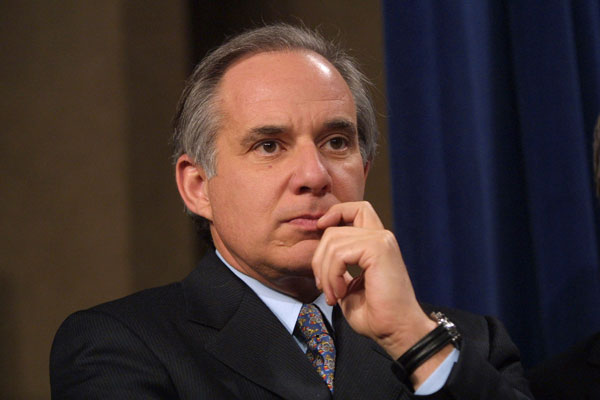Former Sen. Robert Torricelli (D-NJ), who moderated an event on behalf of the Iranian opposition group MEK in Washington D.C. two weeks ago, told TPM in an interview that he is “personally offended” that the group is currently considered a terrorist organization by the State Department. He acknowledged that some of the group’s history — which includes the assassination of several U.S. military personnel and civilians in the 1970s — is “not good,” but argued that the MEK has changed, and is now “one of the only effective tools against the government in Tehran.”
“They’ve been a victim of terribly bad luck,” he said.
Torricelli said he first became aware of the MEK almost 20 years ago and, as his interest has grown, he has “tried to ask every appropriate question” about the group. The MEK, which originally blended Marxism and Islam and which killed a number of Iranian officials in the wake of the 1979 Islamic Revolution, was offered safe haven in Iraq after being kicked out of France in 1986. Saddam Hussein armed the group, and deployed its members in the Iran-Iraq war. The State Department also says that Hussein used the MEK to crack down on Iraqi Shia and Kurds in the early 1990s.
“I’ve convinced myself that whatever they’ve done that was wrong needs to be weighed against what they can do against Tehran,” Torricelli said. He said “it’s hard to fault the MEK for working closely with Saddam against the government in Iran,” and insisted that he has never found “any substance” to reports that the group had attacked Shia and Kurds. Meanwhile, he cited “considerable evidence” that the group was helpful to the U.S. after the 2003 invasion of Iraq.
The MEK has renounced violence and now calls for a “pluralist democracy” in Iran. Torricelli said the group has evolved to focus on “information and political organizing.” The group’s political arm, the National Council of Resistance of Iran, is headquartered in Paris, and the State Department says the group has a “global support network with active lobbying and propaganda efforts in major Western capitals.” Torricelli did acknowledge that the MEK does not have a good relationship with opposition groups inside Iran, like the Green Movement.
“Part of what works for Tehran’s advantage is that the opposition has been so splintered,” Torricelli said, adding: “outside of Iran, [the MEK] appear to be the only group willing to take a risk.”
Furthermore, Torricelli doesn’t believe the MEK needs be embraced in U.S. politics — he just thinks it needs to be recognized that “they are effective for our purposes against Iran.”
“If there’s political change in Iran and we don’t like what they stand for, we can oppose them then,” he said.
Torricelli served 14 years in the House before being elected to the Senate in 1997. In July 2002, Torricelli was “severely admonished” by the Senate Ethics Committee for not disclosing expensive gifts from a contributor who he gave help to, according to The New York Times. The Ethics Committee move came after federal prosecutors ended a long criminal investigation into Torricelli without filing charges. That September, Torricelli decided to end his re-election bid. He now works as a lobbyist.
According to Torricelli, the MEK’s inclusion on the State Department’s terror list “undermines” the list’s credibility. The MEK was put on the list in 1997, in a move that has been considered a nod to Iran’s then-new reformist president. Since then, the State Department has several times declined to remove the group from the list.
“Everyone who apposes the status quo… cannot be so easily labeled a terrorist,” Torricelli said.
Addressing the State Department’s description of the MEK’s “cult-like characteristics,” Torricelli argued it is “not unusual in these movements for a personality to provide focus.”
“One only hopes that it evolves,” he said. “Am I uncomfortable with a cult of personality? Of course I am.”
As to the panel on Jan. 20, which featured a number of national security experts and former lawmakers, Torricelli said he’d been “very pleased” by how it turned out. He could not, however, tell TPM who had organized it.
“You know, I don’t know… I’d have to ask my office,” he said, when asked who had invited him to speak. He did not even know he was going to serve as the event’s moderator until he showed up. He added that it wasn’t unusual for him to be invited to MEK events, just that he had not done anything on the group’s behalf in some time.






